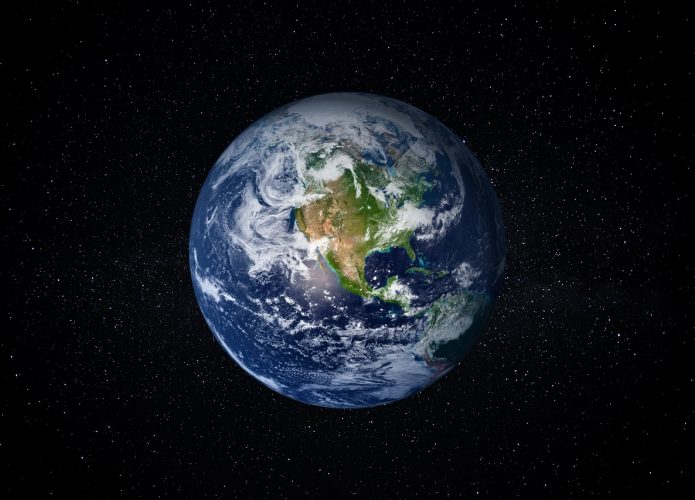Have you ever imagined that we noticed the Earth's rotation and felt dizzy and sick, like when we got off an amusement park ride? The Earth rotates at about 1,666 km/h, or 465 m/s, so why don't we feel that our planet is rotating?
We do not feel that the Earth is rotating due to the law of inertia. This law states that a body tends to remain at rest or in motion unless acted upon by a force. Since the Earth rotates at an almost constant speed, we do not feel the effects of this phenomenon.
Read more:
Furthermore, the Earth's rotation creates an acceleration of about 0.03 m/s^2 at the equator, while the gravitational acceleration is 9.8 m/s^2. Thus, the centrifugal force is imperceptible to us.
The centrifugal inertia force is maximum at the equator and does not exist at the axis of rotation (poles). However, even at the equator, this force is imperceptible to our senses.
The Earth is rotating faster
The speed at which the Earth rotates is very high, but much less than the speed of other stars in the universe.
It takes the Earth 23 hours, 56 minutes, 4 seconds and 0.9 tenths to complete an orbit of 40,075 kilometres. This equates to about 460 meters per second at the equator, or 1,656 km/h.
But the Earth's rotation speed can change. The Earth is rotating faster than it did half a century ago. Global warming and melting glaciers may be responsible for this change.
If the Earth's current rotation speed increased significantly, we would have shorter days and longer nights. The Earth's travel speed also changes as the planet approaches or moves away from the Sun.
Speed x acceleration
We do not feel the speed of the Earth, but rather its acceleration. This behavior of matter is called inertia and is explained by Newton's first law.
The Earth continues at a practically constant speed, which is why we do not feel the effects of this phenomenon. The Earth revolves around the Sun at a speed of 108 thousand km/hour, but we do not feel the Earth's rotation due to relative motion and the force of gravity.
Humans cannot feel a uniform movement like the movement of the Earth. What we feel is acceleration and deceleration.
The Earth is constantly rotating, but we do not feel dizzy or notice this movement because its radius (half the radius of its circumference) is very large – more than 6,000 km.
The Earth rotates because there is no force or resistance to make it stop, simple as that.
When did the Earth start rotating?
The origin of the Earth's rotation is related to the formation process of our planet and the solar system. Billions of years ago, a large cloud of gas and dust began to collapse due to the gravity of the region where the Sun is located today, and the cloud of gas and dust was also rotating in conjunction with our galaxy.
It is believed that the force exerted by the Sun and other planets caused the Earth to experience torques (moments of force) and to gain rotational motion.
As matter concentrated and future planets emerged, space rocks began colliding with the developing planets, exerting forces that caused them to rotate.
What if the Earth stopped rotating?
The planet will suffer dire consequences, such as climate change and the movement of ocean water towards the poles.
Most likely, life on this planet will become extinct. In this case, day and night will last for six months. In this sense, two opposing situations can occur: either the world will become very hot or it will enter an ice age.
If the Earth stopped rotating, our molten iron core would stop too. But this rotation of the nucleus acts like a dynamo, generating our magnetic field. In other words, if the Earth stopped rotating, we would lose our magnetic field.
If spin freezing occurred naturally, we would have six months of light and six months of darkness, because the sun would only rise and set once a year. In other words: a planetary day will last 365 ordinary days.
Everything on Earth's surface will be violently torn apart: cities, oceans, and even air from the atmosphere. People, trees, cars and animals will fly off and collapse on the roof and break into thousands of pieces. Chaos.
How do you feel the planet's rotation?

The easiest way to observe the Earth's rotation is to observe the apparent movement of celestial bodies.
It is also possible to see the effect of the Earth's rotation using a Foucault pendulum. Since the Earth rotates, when the pendulum swings, the Coriolis force causes it to rotate on its axis.

“Hardcore beer fanatic. Falls down a lot. Professional coffee fan. Music ninja.”

![[Atualizado] Players say Ghost of Tsushima update 2.19 “broken” the game](https://psxbrasil.com.br/wp-content/uploads/2022/06/ghostoftsushima_1080_2.jpg)





More Stories
The Udesc Postgraduate Course in Human Movement Sciences is accepting applications
The nurse and health center employee are being investigated regarding the vaccine leak
“We are committed to reducing regional asymmetries,” says Minister Luciana Santos in the central and western phase of 5CNCTI